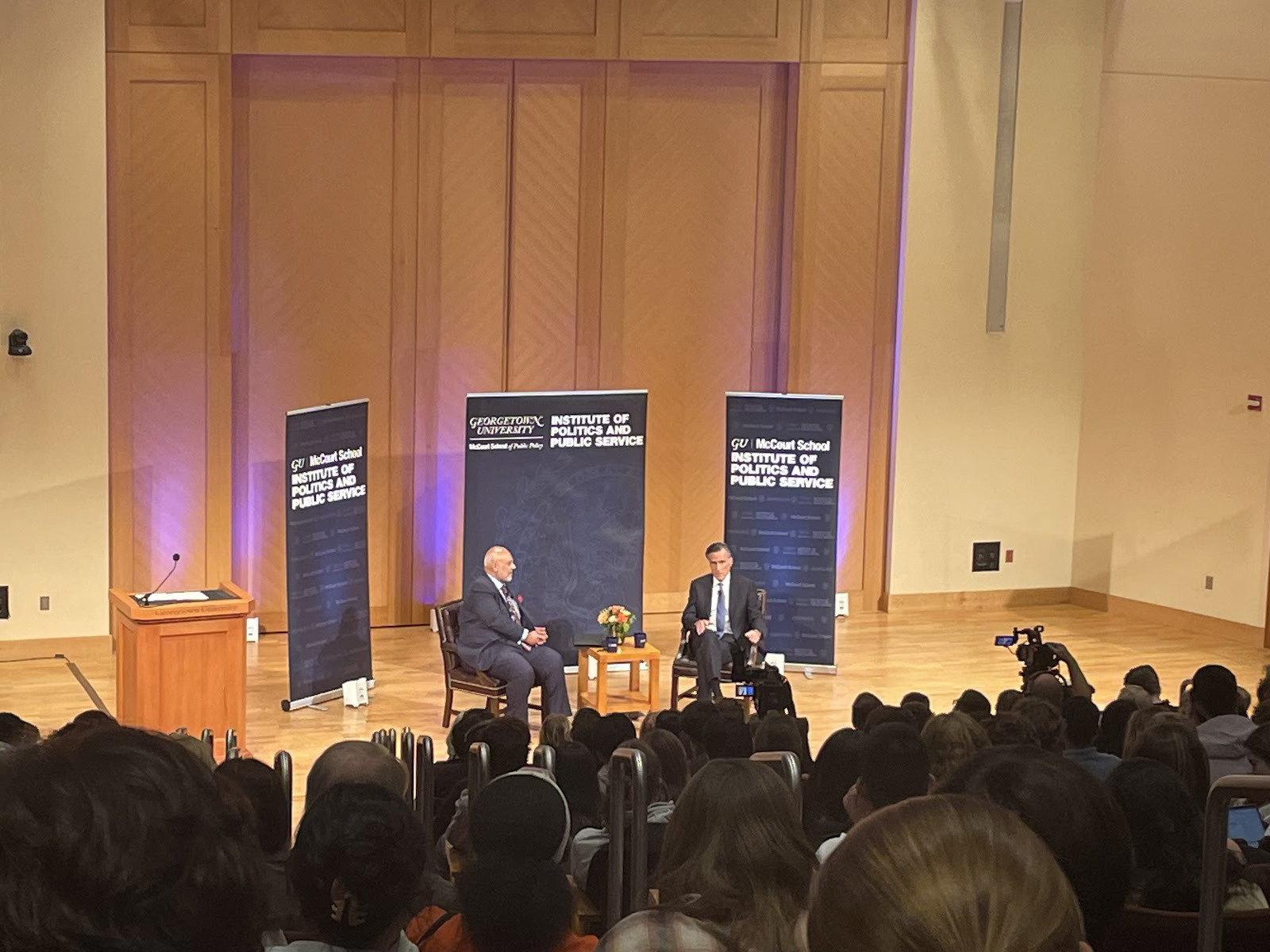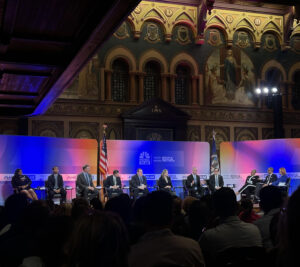U.S. Senator and 2012 Republican presidential nominee Mitt Romney (R-Utah) spoke to a full audience in Lohrfink Auditorium about the state of America’s democracy and his 20 year career in politics. The event was moderated by the director of Georgetown’s Institute of Politics and Public Service (GU Politics), Mo Elleithee (SFS ’94), on Oct. 17.
Alisha Signh (CAS ’25), co-chair of the GU Politics student advisory board, introduced Romney by referencing his reputation for “reaching across the aisle”, involvement in the “G10” working group of bipartisan senators, and leading role in the Bipartisan Emergency Coronavirus Relief Act of 2020.
Elleithee began by asking the senator for his thoughts on how democracy is being practiced in the U.S. today. Romney acknowledged the current divisive political climate between Democrats and Republicans and cited the spread of misinformation as a major factor, specifically due to the rise of social media and other unregulated sources of information.
“Twenty years ago, people read newspapers and magazines and looked at the evening news. Those things were all carefully vetted, in most respects, by editors, fact-checkers and so forth. That’s gone,” he said. “The people who are influencers, if you will, and have the biggest following, are people who are angry.”
Romney claimed that politicians have capitalized on this trend, and that “making a lot of noise” is the “currency of the realm” in today’s political field. He commented on the House speaker race, specifically citing the frequency of politicians like Jim Jordan, who has not authored any bills, nor sponsored any that became laws, to gain a large following through capitalizing on people’s resentment.
“You have people increasingly coming to Washington, whose objective in staying in office is to make noise, not to make law, not to change things in a way that might be better for the country, but just to make a lot of noise, and to show they’re angry and fighting,” he said.
Throughout the conversation, Romney emphasized the need for a generational shift in politics, paralleling his Sept. 11 announcement that he would not seek re-election following the end of his term in Jan. 2025 to make way for a “new generation of leaders.” He recommended that young people get involved in any way they can, whether it’s through direct action or encouraging their friends to vote.
“I’d be really angry if I were you guys, angry enough to be involved in politics, either to run or to support someone who’s running just to show your involvement in the political process,” he said.
The discussion was accented with references to “Romney: A Reckoning,” a biography written about the senator by McKay Coppins that was released on Oct. 24, 2023. One mention referenced Romney and West Virginia Democrat Sen. Joe Manchin’s idea to form a new centrist party. However, when questioned on the possibility, Romney clarified he only considered its creation beneficial for congressional races, not presidential.
“A third party running a nominee for president is not going to accomplish anything other than throw the election as a spoiler to one or the other two major party candidates,” he said. “A third party might raise money, and then listen to both candidates and the two parties, and endorse one of them, and then use the money to help elect that person.”
Similarly, he later stated his support for ranked choice voting, and belief in the permanence of the electoral college and the necessity of the filibuster.
The second half of the discussion was open to questions from the audience. A first-year student in a Bernie Sanders shirt asked Romney about his predictions and hopes for the Republican party. Romney responded that the party will be shaped by who they nominate for president, especially if they decide to endorse Donald Trump. He said that the future depends on appealing to younger voters who aren’t interested in MAGA anymore.
“Ultimately my party has no electoral prospects if all we can get is old white guys,” he said. “Because we’re dying.” He also joked that if there was one thing he would do differently in his career, it would be to win every election.
In response to one of the final student questions, Romney said he was most proud of his plan as Massachusetts governor that got almost every person in the state on health insurance. Despite primarily reflecting on his long career throughout the event, he shared that he’s not done just yet.
“As a Senator, I’m not finished yet, so I’m going to keep on working.”







